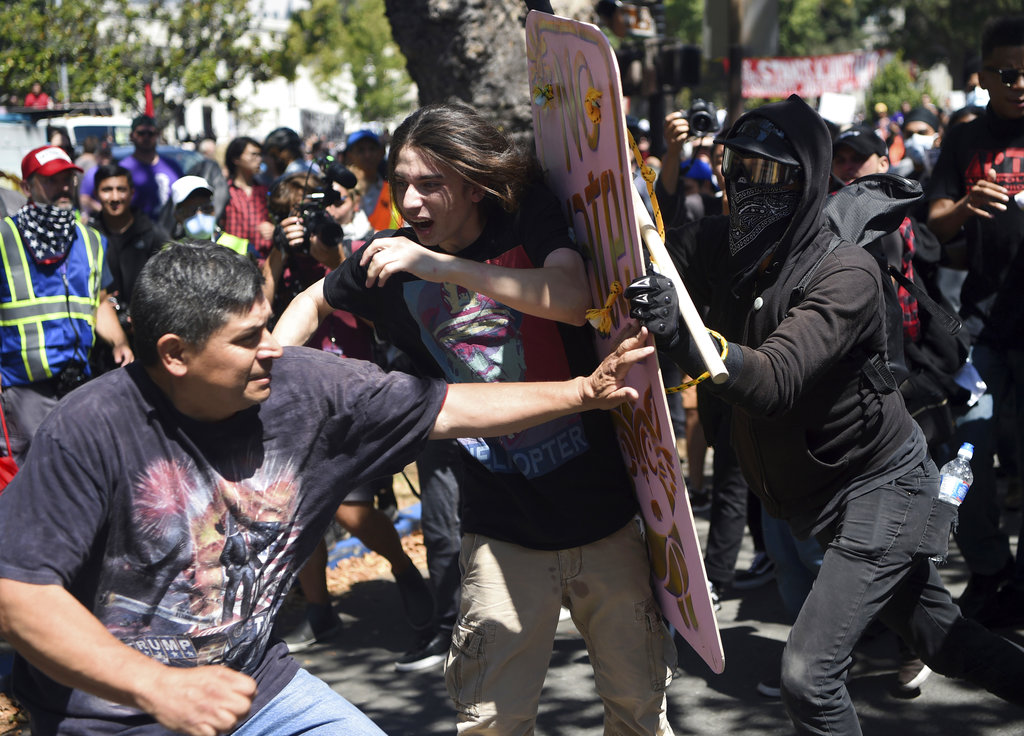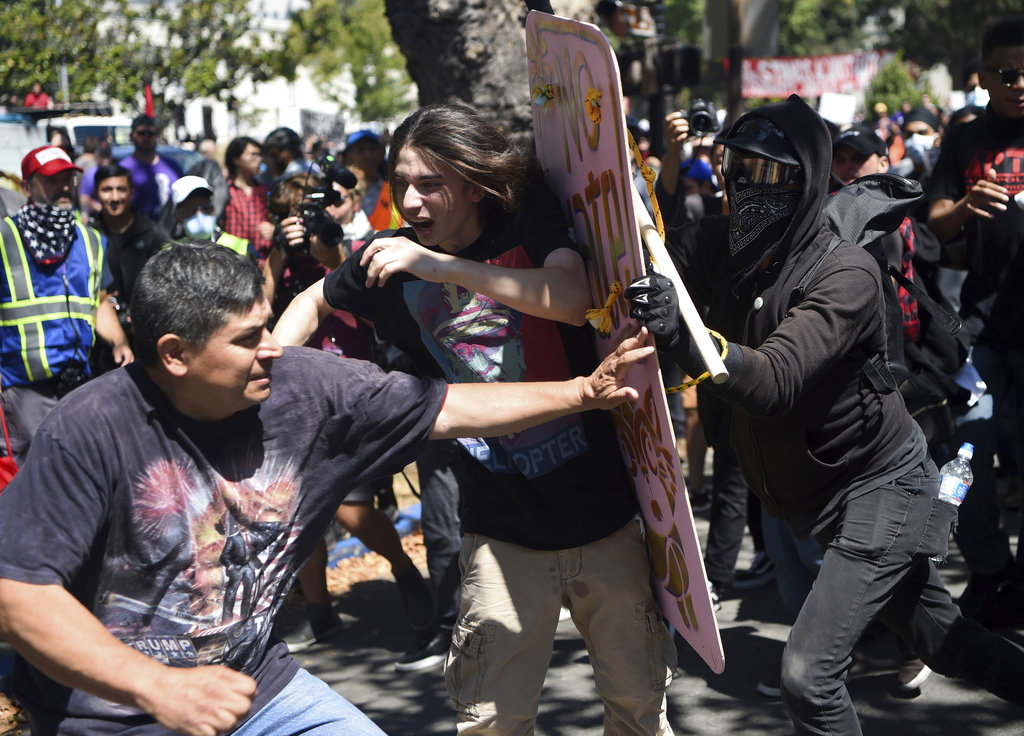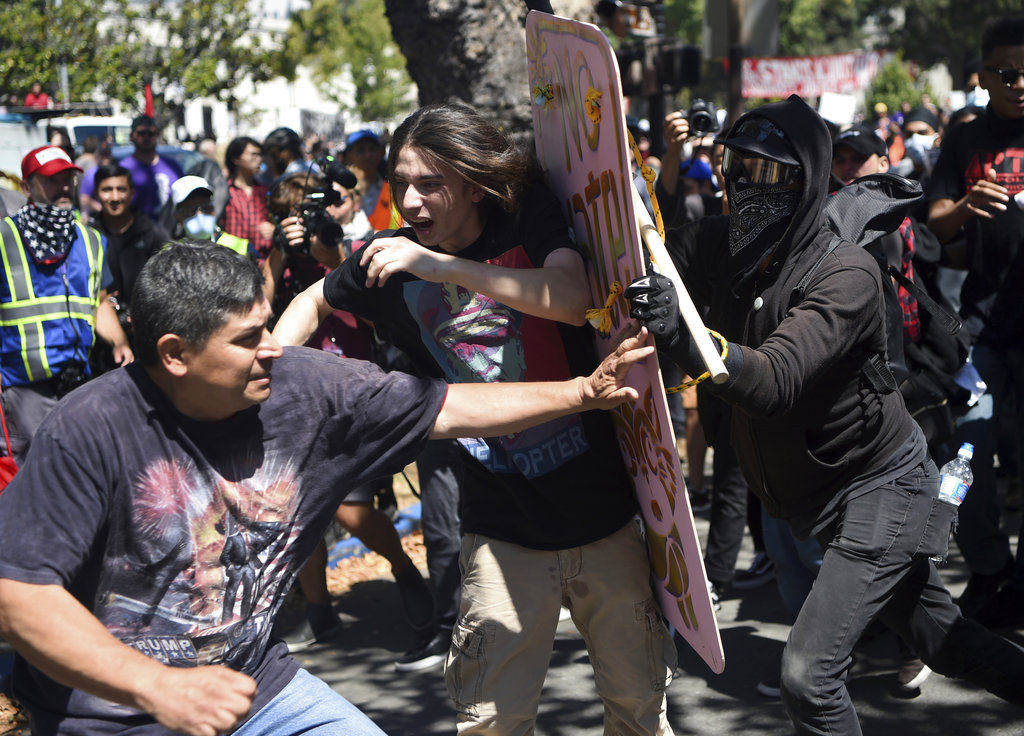Antifa’s heritage of oppression
{$excerpt:n}


(AP Photo/Josh Edelson)
If I was asked to adumbrate the views of modern American anti-fascism (Antifa) in two sentences, I would have to pilfer a riveting passage from the otherwise monotonous “Anti-Fascist Handbook,” penned haphazardly by professor Mark Bray.
“At the heart of the anti-fascist outlook is a rejection of the classical liberal phrase incorrectly ascribed to Voltaire that ‘I disapprove of what you have to say, but I will defend to the death your right to say it,’” the professor writes.
“After Auschwitz and Treblinka, anti-fascists committed themselves to fighting to the death the ability of organized Nazis to say anything.”
Bray’s honest observation, besides the self-evident irony of fighting fascism with fascist tactics, almost seems refreshingly original. After all, it is rare to see a radical progressive movement leave the familiar battlefield of social justice, drop the shield of “diversity” with which it deflects the most acute condemnations, and aim its spear directly at the heart of free expression. While the First Amendment was always the enemy of the American far-left, the attack mounted against it was never as bold and forthright as it is today.
But perhaps the most telling characteristic of Antifa is the fact that it never evolved past its totalitarian heritage. Beneath the fresh coat of black paint are the same faces of oppression that have rioted their way into the gold-plated rooms of Moscow’s Kremlin.
It is, therefore, no coincidence that the contemporary Antifa movement, much like the dated communist idols of my motherland, always give in to the seductive desire to seize the freedom of expression exclusively for themselves.
“When people accuse us of repression, I become bewildered by how quickly they forget the most elementary principles of Marxism,” Vladimir Lenin once said in an interview, justifying the violent tactics used to eradicate anti-Soviet dissent.
The Marxist connection to anti-fascism was never intended to be a veiled secret. Even professor Bray notes that the ideology of each Antifa chapter “can be discerned in a group’s flag logo: whether the red flag is in front of the black or vice versa.”
The similarities, however, are not merely cosmetic. At the heart of the Bolshevik revolutionary campaign was Lenin’s uncompromising view that his adversaries did not deserve a right to articulate their perspectives. Lenin’s attitude was shocking even to many of his fellow revolutionaries, and is well documented by scholars such as Richard Pipes and David Shub.
Unquestionably, the Communist Party of the Soviet Union was the largest and the most influential “antifa” organization to accumulate and maintain sizable political power. And just like the modern Antifa groups in America, its desire to suppress intellectual dissent by any means necessary always meant that it shared common ground with the mentality of Adolf Hitler. It is, after all, no accident that under proper geopolitical conditions the communist leadership of the USSR had no difficulty drafting up a defense pact with their German counterparts.
In a slapdash attempt to obscure its ideological proximity to fascism, the modern Antifa movement is now desperate to frame itself as the enemy of the “far right.” This is an amusing deception. Liberating the markets from government oversight, minimizing federal authority in local affairs, and dramatically slashing taxation would result in a form of unrestrained libertarianism, not fascism. In fact, some would even consider the far right to be a form anarchy, which poses a special problem to Antifa groups that claim to adopt the latter identity. Indeed, how can the far right be fighting itself?
As it stands today, Antifa’s internal contradictions and inconsistencies are not only undermining the movement’s legitimacy, but are also serving as a primary recruitment tool for its adversaries. Despite these challenges, however, the core problem with Antifa is rooted in its stance on free speech. If the anti-fascist movement continues to retreat from the battleground of ideas and seek refuge in violence, nothing will ever save it from eventual irrelevance and extinction.
The post Antifa’s heritage of oppression appeared first on Red Alert Politics.
Source: Red Alert Politics



